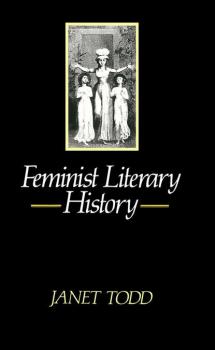ТОП просматриваемых книг сайта:
Janet Todd
Список книг автора Janet ToddАннотация
In this timely book Janet Todd offers an analysis and defence of the feminist literary history practised by Elaine Showalter and other contemporary American literary critics. She argues that this approach rightly links the political concerns of feminist criticism to the uncovering of female voices embedded in history. Todd reconstructs the development of feminist literary history from the 1960s through to the present day, highlighting the central themes as well as the strengths and weaknesses. She then examines the debate between American feminist critics, on the one hand, and feminist critics inspired by the work of French theorists such as Kristeva, Irigaray and Cixous, on the other. She defends feminist literary history against its critics and casts doubt on some of the uses of psychoanalysis in feminism. Todd also considers the debate with men and assesses the relevance of academic analyses of gender, masculinity and homosexuality. Feminist Literary History is a forceful and committed work, which addresses some of the most important issues in contemporary feminist theory and literary criticism. It will be widely read as an introductory text by students in English literature, modern languages, women's studies and cultural studies.
Аннотация
Coming to PBS Masterpiece Classic soon! Gorgeous, profound, delightful, useful, original, this fully illustrated, informative volume combines Jane Austen's Sanditon novel and Janet Todd's ground-breaking essay. </p> <p> «I so enjoyed Janet Todd's beautifully produced book.»Andrew Davies, screenwriter. </p> <p> Sanditon is Jane Austen’s last novel, left unfinished when she died. A comedy, it continues the strain of burlesque and caricature she wrote as a teenager and in private throughout her life. This beautifully illustrated volume combines the full novel and Todd’s ground-breaking essay, where she contextualizes Austen’s life and work, Sanditon’s connection with Northanger Abbey (1818) and the Austen family’s speculation in England and the West Indies. She examines the moral and social problems of capitalism, entrepreneurship, and whether wealth trickles down to benefit the place it is made. In explaining the early nineteenth-century culture of self: the exploitation of hypochondria, health fads, seaside resorts, cures, she contends that Sanditon is an innovative, ebullient study of human beings’ vagaries – rather than using common sense, Sanditon’s characters follow intuition and bodily signs believing that desire can be translated into physical facts and speech can transform fantasy into reality. Todd shows Austen’s themes to be akin to contemporary concerns: the mistakes of the self-deluded reveal the inevitable, ridiculous gap between how we think of ourselves and how we appear and sound to others.


